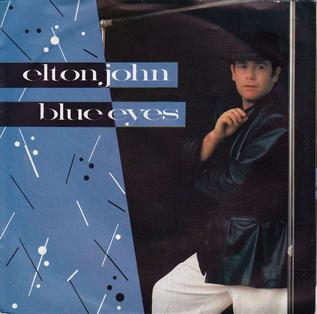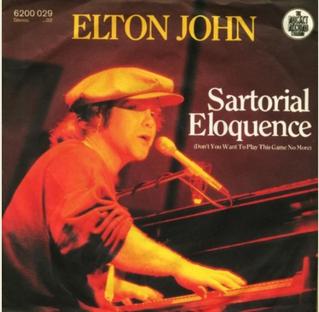
Bernard John Taupin is an English lyricist and visual artist. He is best known for his songwriting partnership with Elton John, recognised as one of the most successful partnerships of its kind in history. Taupin co-wrote the majority of John's songs, dating back to the 1960s.

A Single Man is the twelfth studio album by English musician Elton John. Released in 1978, it is the first album for which Gary Osborne replaced Bernie Taupin as lyricist. It is also the first of two John albums that, on the original cut, have no tracks co-written by Taupin.

"Candle in the Wind 1997", also known as "Goodbye England's Rose" and "Candle in the Wind '97", is a threnody by English musician Elton John and songwriter Bernie Taupin, a re-written and re-recorded version of their 1973 song "Candle in the Wind". It was released on 13 September 1997 as a tribute single to Diana, Princess of Wales, with the global proceeds from the song going towards Diana's charities. In many countries, it was pressed as a double A-side with "Something About the Way You Look Tonight". It was produced by Sir George Martin.

21 at 33 is the fourteenth studio album by British musician Elton John. It was released on 23 May 1980, through MCA Records in the US and The Rocket Record Company in all other territories. The album was co-produced by John and Clive Franks, and was primarily recorded in August 1979 at Super Bear Studios in Nice, France. The record was the first since Blue Moves (1976) to feature lyrics written by Bernie Taupin, while John also continued to experiment with other lyricists, including Gary Osborne and Tom Robinson. Contributors to the album include members of Toto and the Eagles, as well as Dee Murray and Nigel Olsson, marking their first appearance on an Elton John album since Captain Fantastic and the Brown Dirt Cowboy (1975).

The Fox is the fifteenth studio album by English musician Elton John. It was released on 20 May 1981, through Geffen Records in the US and The Rocket Record Company in all other territories. The album was John's first to be produced by Chris Thomas, who would go on to produce many of John's albums throughout the 1980s and 1990s, as well as John and Clive Franks. In addition to material written and recorded specifically for the album, multiple tracks originated from the sessions for John's previous album, 21 at 33 (1980).

"Can You Feel the Love Tonight" is a song from Disney's 1994 animated feature film The Lion King composed by English musician Elton John with lyrics by Tim Rice. Released as a single in May 1994, the song was a hit in the UK, peaking at number 14 on the UK Singles Chart, and achieved success in the United States, reaching number four on the Billboard Hot 100. The song was a number-one hit in Canada and France. At the 67th Academy Awards in March 1995, it won the Academy Award for Best Original Song. The same year, the song also won John the Grammy Award for Best Male Pop Vocal Performance. Completing a trifecta, the song also won a Golden Globe at the 52nd Golden Globe Awards held in 1995 for Best Song - Motion Picture.

"Saturday Night's Alright for Fighting" (sometimes written "Saturday Night's Alright (For Fighting)") is a song originally recorded by English musician Elton John. John composed it with his long-time songwriting partner Bernie Taupin. It was released on John's best-selling album Goodbye Yellow Brick Road (1973) and as the first single. It has been covered by many artists and featured on motion picture, video game, and television soundtracks.

"Philadelphia Freedom" is a song by English musician Elton John and songwriter Bernie Taupin. It was released as a single on 28 February 1975, credited to the Elton John Band. The song was the fourth of John's six number-one singles in the US during the early and mid-1970s, which saw his recordings dominating the charts. In Canada it was his eighth single to hit the top of the RPM national singles chart.
"Elton's Song" is a song written by Elton John (music) and Tom Robinson (lyrics). Recorded between August 1979 and March 1980 and produced by John and Clive Franks, the song first appeared much later on the 1981 album The Fox. The song is a rhapsodic ode with a theme of unrequited love.

"Blue Eyes" is a song performed by British musician Elton John with music and lyrics written by John and Gary Osborne. It was released in 1982 as the UK lead single from John's 16th studio album, Jump Up! (1982). It was released as the album's second single in the US. It hit No. 8 in the UK; in the US, it spent three weeks at No. 10 on the Cash Box chart, went to No. 12 on the Billboard Hot 100, and spent two weeks at No. 1 on the Billboard AC chart. John performed this song often in his concerts until 2012.

"Sartorial Eloquence" is a song by British musician Elton John with lyrics written by Tom Robinson. It is the third track of his 1980 studio album, 21 at 33. In the UK, it was issued as "Sartorial Eloquence", and in the US as "Don't Ya Wanna Play This Game No More?". It reached No. 39 on the Billboard Hot 100 and No. 45 Adult Contemporary, falling just short of the Top 40 in the UK (#44), and making lesser showings in Canada (#57) and Australia (#91).

"Circle of Life" is a song from Disney's 1994 animated feature film The Lion King. Composed by musician Elton John and composer Hans Zimmer, with lyrics by Tim Rice, the song was performed by Carmen Twillie and Lebo M as the film's opening song. In an interview, Rice said he was amazed at the speed with which John composed: "I gave him the lyrics at the beginning of the session at about two in the afternoon. By half-past three, he'd finished writing and recording a stunning demo." John sang a pop version of the song with the London Community Gospel Choir, which was included in the film's soundtrack and made into a music video.

"Part-Time Love" is a song written by English musician Elton John with lyrics by Gary Osborne. It is the sixth track off his 1978 album, A Single Man. It is also the opening track of side two. It proved to be one of the most popular singles the pair wrote, along with 1982's "Blue Eyes" and the 1980 US million seller "Little Jeannie". It was banned in the Soviet release of the album along with another song, "Big Dipper". The single reached No. 15 in the UK and peaked just outside the Top 20 in the US at No. 22.
"Amoureuse" is a French language composition by Véronique Sanson introduced on her 1972 album of the same name. Rendered in English the song became a hit single for Kiki Dee and – as "Emotion" – for Helen Reddy.

"You Gotta Love Someone" is a song by English musician Elton John, written by John along with Bernie Taupin and released as a single from the Days of Thunder soundtrack in October 1990. The single was also used to promote the Rocket Records 2-CD retrospective The Very Best of Elton John, issued largely in overseas markets excluding the United States, where the more expansive box set To Be Continued... was issued.
"Teacher I Need You" is a song written by English musician Elton John and songwriter Bernie Taupin, and performed by John. It was first released on John's 1973 album Don't Shoot Me I'm Only the Piano Player. The lyrics tell of a schoolboy's crush on his teacher, and the music evokes the sound of 1950s songs.

"Elderberry Wine" is a song written by English musician Elton John and songwriter Bernie Taupin, and performed by John. It was first released on John's 1973 album Don't Shoot Me I'm Only the Piano Player. It was also released as the B-side of John's No. 1 hit "Crocodile Rock" in October 1972. It was also popular on album-oriented rock radio stations. John played it live during his 1973 tour. It was covered by Irish-Scots singer Mae McKenna.

"Harmony" is a song written by English musician Elton John and songwriter Bernie Taupin, and performed by John. It is the final song on the 1973 double album Goodbye Yellow Brick Road. The song was recorded in May 1973, at Château d'Hérouville, France.

"Rocket Man(I Think It's Going to Be a Long, Long Time)" is a song written by English musician Elton John and songwriter Bernie Taupin and performed by John. It was originally released on 17 April 1972 in the US, as the lead single to John's album Honky Château. The song first charted in the UK on 22 April, rising to No. 2 in the UK Singles Chart and No. 6 in the US Billboard Hot 100, becoming a major hit single for John.

"The Loser Gets to Win" is a song by English singer Kiki Dee, released on 14 October 1983 by EMI as a non-album single. The song was written by Dee, Harry Bogdanovs and Gary Osborne, and produced Elton John and Osborne.
















